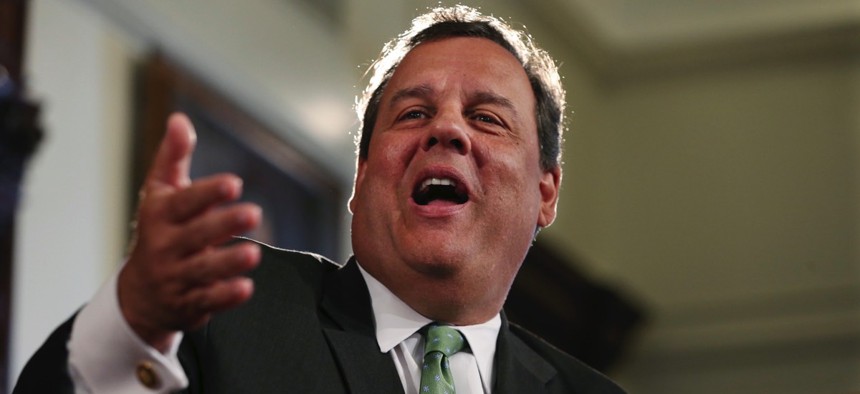Christie’s Big Move on N.J. Transportation Funding; Texas Court Strikes Down City’s Plastic Bag Ban

New Jersey Gov. Chris Christie Mel Evans / AP Photo
Also in our State and Local Daily Digest: Maine’s proposal to revise mining rules; N.Y.C. infrastructure guessing game; homeless shelter quandary in Salt Lake City
TRENTON, NEW JERSEY
INFRASTRUCTURE | With New Jersey at an impasse on transportation financing, Gov. Chris Christie issued an executive order to cover emergency roadwork with money from the state’s general fund. The transportation fund itself is “days away from exhausting,” Christie said. Christie is pointing fingers at the legislature for inaction and the legislature back at Christie for stalling on a deal until after the November election. The only thing agreed on by lawmakers working on the deal is the need to raise the gas tax by 23 cents per gallon. [Bergen Record]
LAREDO, TEXAS
LOCAL CONTROL | The city’s plastic bag ban was struck down by a state appeals court, likely undermining local control on the issue across Texas. Merchants and free-market groups argued the ban violated state law regulating solid waste disposal. Laredo argued the ban was meant to beautify the city and limit storm drain clogs. [The Texas Tribune]
AUGUSTA, MAINE
MINING | The Department of Environmental Protection in the Pine Tree State is proposing a revision of the metallic mining regulations, reviving what has been a lengthy and contentious debate over the industry in the state. However, some say the proposed rule changes don’t go far enough. “I think it still has very big problems,” said Nick Bennett, staff scientist at the Natural Resources Council of Maine. “For example, it allows mines in floodplains and flood hazard areas. Why would anybody do that?” [Portland Press Herald]
NEW YORK CITY, NEW YORK
PUBLIC WORKS | There’s no official map of the city underground, which means everytime private companies make changes to infrastructure workers must figure out what belongs to whom. And those changes reverberate above ground where asphalt is continuously torn up, when the Transportation Department permits—inevitably disrupting traffic. Reducing the number of instances is a city goal, but that’s not easy when you throw in wear and tear and the fact the city is hamstrung by legacy infrastructure. “If we could go back in time, utilities would be put elsewhere,” said former Transportation Commissioner Lucius Riccio. “But we’re stuck with the city we have.” [The New York TImes]
SALT LAKE CITY, UTAH
HOMELESSNESS | Utah’s legislature has allocated $9.4 million this year to building two 250-bed shelters in the Salt Lake City area to take pressure off an existing shelter whose resources are stretched too thin. The process is stalled, however by the fact that no one knows where those two new shelters should be located. The City Council is concerned about the impact shelters of that scale would have on a Salt Lake City neighborhood, with some on the council even suggesting that 250 beds is too big. [The Salt Lake Tribune]
IDAHO CITY, IDAHO
PARKS AND RECREATION | Due to the Pioneer Fire, it isn’t likely Idaho State Parks and Recreation will be able to operate its system of six yurts northeast of Idaho City this winter. Fire has destroyed at least one of these yurts and there has been significant damage for most of the others. Firefighters were able to save the structures by using protective heat wrapping. It’s unclear when these areas will be open to the public again because the fire is still burning. [Idaho Statesman]





